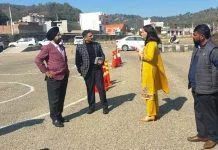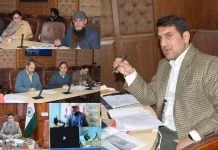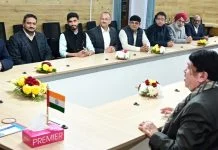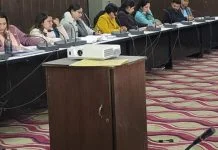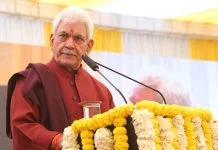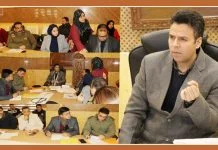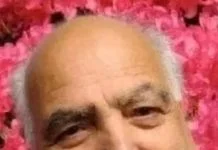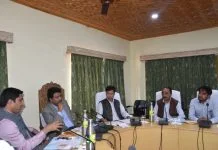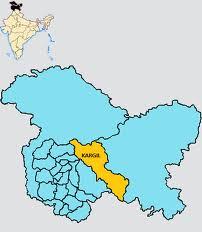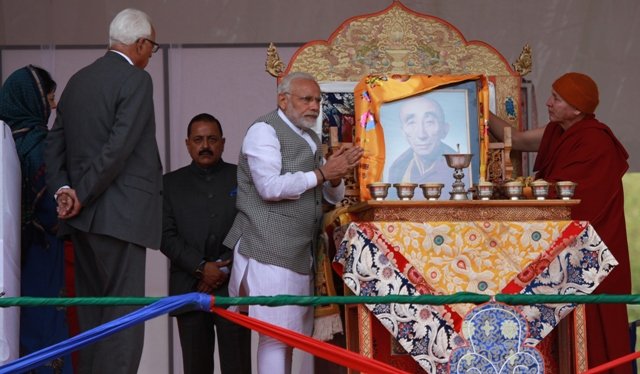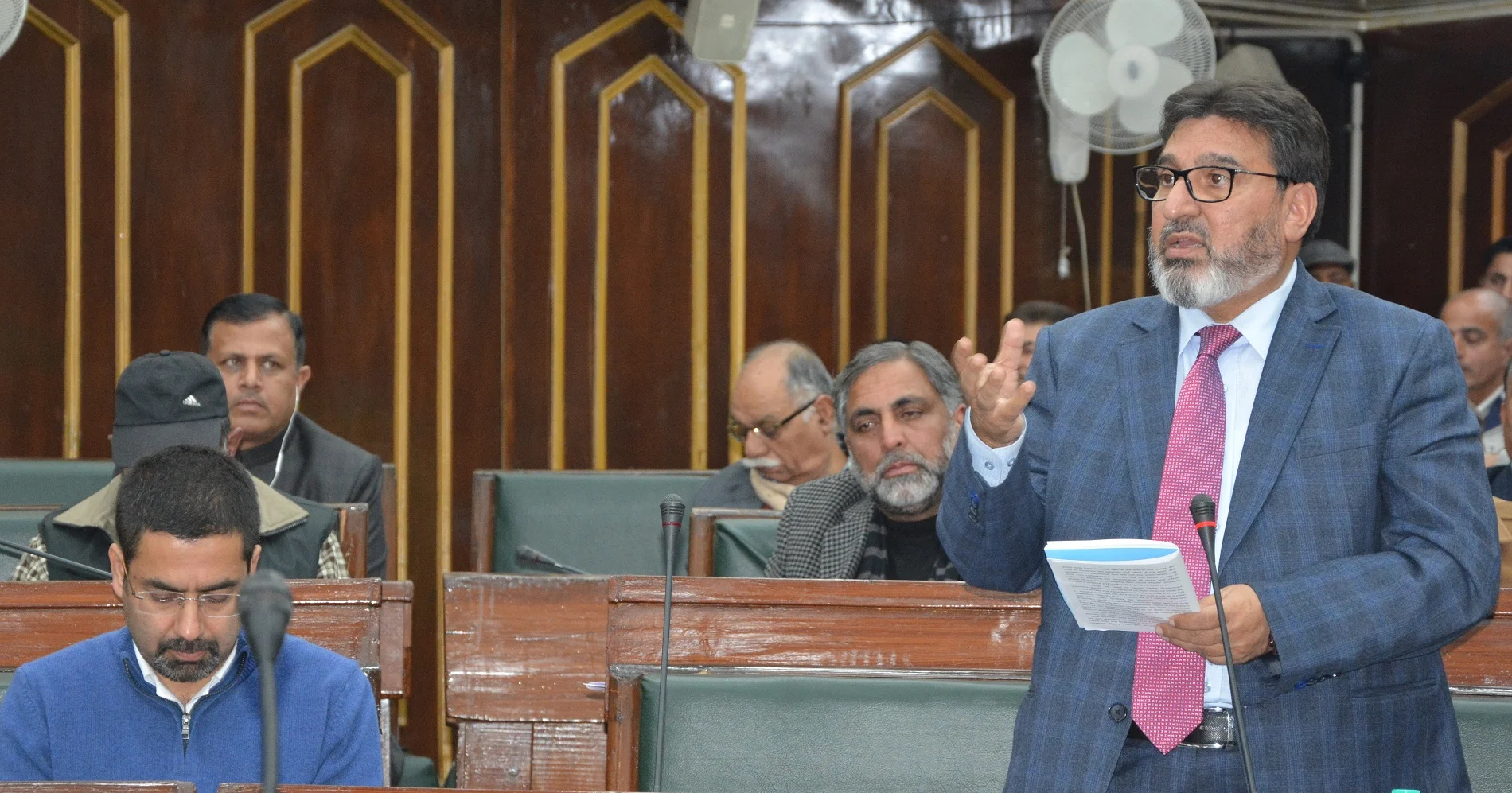Terming education as cog-in-the-wheel of progress at all levels, Minister for Education Syed Mohammad Altaf Bukhari today said despite many odds and varied challenges the government succeeded to putting decrepit education system back on track and the recent board results in Kashmir offer a silver lining amid the dark clouds.
Winding up the discussion on Demand for Grants of the Education and allied Departments under his charge and responding to the points raised by the legislators, the Minister stressed on engaging in a constructive dialogue on improving the contours of the education sector, and emphasised that ‘it requires all of us to rise above political affiliations and considerations.’
He welcomed the suggestions of the Legislators and assured them that the same would be incorporated to streamline the functioning of the Department.
Admitting it was hard to bring a discernible change on the ground in the backdrop of huge gaps and challenges posed by law and order situation, he said to paint a rosy picture won’t be the right thing.
He however said that investment in education would mean investment in the future of the children ‘Nation Builders of Tomorrow’.
“Considering this fact, Government has decided on three-fold increase in the CAPEX Budget of School Education Department for the year 2018-19, “the Minister said.
He expressed gratitude to Chief Minister Mehbooba Mufti and the Finance Minister Dr Haseeb Drabu for having considered his projections made during series of interactions held with them.
He informed it was due to their personal efforts of the Finance Minister that despite shortfall in the allocation of salaries of SSA Teachers by the Central Government, the Finance Department has gone out of way in disbursing salaries to these Teachers from the State Budget.
The Minister reminded the members of the series of marathon constituency-wise meetings taken by him to review the education sector.
“I hope that the members by now must have framed a blueprint of their respective constituencies as the ownership of education in their areas has already been vested in them during these meetings,” he asserted and said one of the first steps in strategic partnership with the Legislators and MPs can take towards upgrading infrastructure in education sector will be their commitment to contribute Rs 1 crore each out of their CDF and MPLAD grants towards education sector. He assured that the funds provided shall be spent as per the demands of the Legislators and Parliamentarians in their respective constituencies.
He informed the house that the State Cabinet has given nod to the up-gradation of 400 schools from Middle to High and High to Higher Secondary level and establishment of 17 new degree colleges in the State.
The Minister informed that to compensate the loss of time of students of schools and colleges due to frequent disruptions, his Ministry is seriously considering notifying a separate ‘Education Calendar’ that minimises holidays and enables the teachers to complete their syllabi well in time. He sought support of the people in safeguarding the education sector from frequent disruptions and called for exempting teachers from all non-academic duties in the larger interest of the student community.
“We cannot afford to make our students suffer for this, teachers have to be discharged from all non-teaching assignments, including election-related duties,” he said.
He said present Government has already demonstrated its commitment towards working in tandem with Legislators, cutting across the political divide, by requesting them to identify schools, in order of their preference, in their respective constituencies which qualify for such up-gradation.
The Minister said the state cannot lose focus unless remedial measures are taken, education can become the first casualty of any conflict situation. “It was not easy to bring back the students from the streets to the classrooms where they actually belong. Despite extreme provocation, I take great pride in stating that not a single FIR was registered against the protesting students’ last year.” he said. “This House should know that our students, especially adolescents, are passing through difficult times and require our handholding,” he said and called for involving them in decision-making processes.
For this, he suggested for forming ‘Student Councils’ which shall monitor the affairs of schools and colleges. He said the government will welcome vibrant collective participation in spirit of the democratic setup where all people have the right to voice their concerns in a peaceful manner.
He said that the additional corpus of Rs 100 crore with contribution of the MLAs and MPs was to make them partners in the development of education system in the State. He called for spending the generated money on fencing and creating other facilities for security of the students and prevent outside interference.
“Till our schools remain unfenced and insecure in absence of permanent watch-and-ward, they will continue to remain extremely vulnerable to anti-social activities. Also, in a state like J&K that has remained in a perpetual state of turbulence, security remains a buzzword. We need watch-and-ward in every school so that we safeguard our students and educational infrastructure” he asserted. He suggested for creation of a simple mechanism for watch-and-ward of Schools by way of engaging chowkidars.
Saying that the stat is still reprieving from the unrest of 2016 which took a heavy toll of the education sector, he said a large number of School buildings were specifically targeted by miscreants and around 32 Schools buildings were gutted, leaving the students in a lurch.
Sharing the views of the members to revisit the present education system, the Minister acknowledged that JK students have great potential and said “If we are able to nurture them and link education with skill and employability, we will achieve our goal of making our college and university campuses sought-after centres of excellence where top-notch companies would hunt for skilled human resource.”
He said with this view vocational Education is being imparted in 10 trades viz., IT/ ITES, Retail, Healthcare, Travel & Tourism, Agriculture, Telecommunications, Physical Education, Beauty and wellness Media & Entertainment and Security. It shall be my endeavour to broaden the scope of trades after proper mapping.
He said for enhancing employability of college pass outs, various Skill Development Courses have been introduced in the colleges like, Dying Technology and Block Printing, Hospitality and Catering Technology, Fruit Preservation & Mushroom Cultivation, Sericulture, Tourism & Travel Management, Hospitality and Catering, Spoken Persian, Interior Designing, Florist Shop Fundamental of Computers and its operating system, E-Learning (through Smart Class/EduSat/E-Library), Information Technology etc.
Calling for being more liberal while funding educational infrastructure, he said majority of the government Schools are in a pathetic state and lack even basic facilities like electricity, drinking water, lavatories, ramps, playgrounds, computer-aided labs and tools of modern learning like Smart Classrooms.
“Unless we address this huge infrastructural gap, any false promise of revamping the educational sector shall remain an absurd pretence and nothing more than a charade. After carrying out detailed assessment of existing infrastructure gap, it has been assessed that the School Education Department requires additional funding to the tune of Rs. 2500 crore towards renovation of existing infrastructure facilities. Similarly in the Higher Education sector, which is a relatively new Department, there is an urgent requirement of around Rs. 1300 crore, to bridge over infrastructure gap” the Minister asserted.
He said after intensive study and feedback, the department has been able to draw a perspective plan for the next three years to bring out a visible change on the ground in terms of augmenting infrastructure development in the education sector. “To implement this perspective plan, a first tranche of Rs 400 crore in School Education Department and Rs. 200 crore in Higher Education Department is immediately required to set the ball rolling” he added.
He, however, said under Rashtriya Ucchatar Shiksha Abhiyan (RUSA), the Central flagship scheme, the government is trying to address key areas to make the institutes of higher learning centres of excellence.
Citing that there was an urgent need to construct around 3200 additional classrooms in high and higher secondary Schools and 5500 classrooms in primary and upper primary, as per present enrolment, the Minister said the department needs more than this.
He said for expediting the development works, his ministry has passed orders for creation of separate engineering wing in the Department. He hoped that the government would soon provide budgetary support required towards creation of requisite posts to make these four engineering divisions fully functional.
He said apart from narrowing down infrastructure gaps, the quality of education imparted to the students in Schools remains of paramount importance adding under the flagship programmes of Sarva Shikhsha Abhiyan (SSA) and Rashtriya Madhyamik Shiksha Abhiyan (RMSA), learning outcomes are being used as tools of assessment standards indicating the expected levels of learning that children should achieve for that class, he added.
“These learning outcomes are also helping our Teachers in understanding the learning levels of children in their respective classes individually as well as collectively” he said.
He also informed the house that the department was embarking on student exchange programme to expose state students to their counterparts in the rest of the country. “Even as I speak here, a contingent of 550 students and teachers are in Delhi for an exposure visit and student exchange programme” he informed further” he told the house.
In another leap to achieve the set goals, he informed the state government has recently entered into a memorandum of Understanding with MHRD extending fund and expertise support to improve quality education and create better human resource to enable the students to perform at the cutting edge level.
Responding to issues raised by the members regarding private educational institutions, the Minister said undisputedly they have vast contribution in imparting quality education in the State.
“After all, it is our children who are enrolled in these Schools. Let us not be parochial and see these 5300 Schools as competitors or rivals but as real partners in the field of education.” He, however, said that there are certain issues with the functioning of the private schools which we are looking into, especially the one related to regulation of fee structure, purchase of textbooks and school uniforms for which this House has expressed concern. “To address this, the School Education Department is actively considering bringing in legislation to regulate fee structure of all private educational institutions in the State so that we do not see these only as profiteering tuck-shops, as the Hon’ble Supreme Court observed” the Minister added.
Listing the measures taken to reform examination process, the Minister said J&K State Board of School Education has to play a pivotal role.
“We have a zero tolerance policy towards unfair means and have recently suspended several officers and officials on invigilation duty for not performing diligently. Some of them have also been handed life-time bans from performing such duties in future. We have also reconstituted the Board of Governors of JK BOSE and I exude confidence that it shall take effective steps in improving the quality of textbooks and hold time-bound examinations in a fair and transparent manner.
He said performance of government schools in recent board exam results in Kashmir offer a silver linings which holds hope for future adding that in 10th Class examinations most of the merit positions have been bagged by the students of Government Schools, while in Class 12th examinations, the Government Schools have recorded 60 per cent result and 35 students from these institutions have figured in first 10 positions while bagging first positions in the Arts, Home Science and Commerce streams and of 9000 distinctions, 7000 distinctions went to Government Schools. He said that the credit of success of students also goes to the teaching staff for motivating them to return to their classrooms.
However, he called for some corrective measures for further improvement and noted that it is matter of concern that despite having most qualified teachers there was a yawning gap in the overall results of Government Schools in comparison to private schools.
Reiterating government’s commitment to address the issues of teachers, the Minister said that they are facing the career progression and to address this problem he has requested to Chief Minister to sanction a Special Human Resource Management (HRM) branch in the Department to address the issue of cadre management.
He hoped that the General Administration Department would soon sanction HRM branch adding that simultaneously directions have been issued for holding DPCs/ PSC meetings for effecting promotions and regularization at different levels.
He informed that around 933 new Lecturers in various disciplines have joined the Department and have been posted in various Schools, while 1409 new Assistant Professors have been appointed in the Higher education Department. He said that 469 more posts of Assistant Professors in various disciplines have been referred to PSC for selection of suitable candidates.
He said to address staff dearth in the school education, around 2154 posts of Teachers and 1296 posts of non-teaching staff have been referred to SSB for fast-track recruitment.
He further informed that government has identified more posts under direct recruitment quota and after working out modalities, these would be referred to SSB and PSC for selection of suitable candidates.
“These new recruitments as well as promotions by way of DPCs shall go a long way in filling up vacant posts of Teachers and Lecturers especially in remote areas of the State’ he informed and said the Department has recently amended the subordinate recruitment rules for selection of subject-specific Teachers, especially recognizing the need for teachers in Mathematics, Science and Urdu subjects.
The Minister also listed the measures to streamline the transfers and postings of teaching staff at different levels and said attachments and deployment of teachers for non-teaching assignments remains the Achilles Heel and the biggest challenge confronting the Department right now. He said there was an urgent need to create a strong deterrent to discourage premature transfers, attachment or deployment of teaching staff, which also puts a serious question mark over the motivation of the teaching staff.
He further informed that the education ministry was actively considering bringing in Regularized Rehbar-e-Taleem Teachers (RRTs) under the ambit of the extant transfer policy so that they do not feel left out.
On filling up of vacant posts of ReTs, he said that the department has undertaken fresh exercise for rationalization in the Department and till it completes new ReT recruitment has been kept on hold.
Earlier several members participated in the discussion on Demand for Grants of the Education and allied Departments. They include Sat Paul Sharma, Mian Altaf Ahmad, Javid Hassan Beigh, Asgar Ali Karbalie, Hakeem Mohammad Yasin, Neelam Kumar Langeh, Aga Syed Rahullah Mehdi, Mohammad Khalil Bandh, Deldan Namgyal, Mohammad Yousuf Tarigami, Shakti Raj Parihar, Ali Mohammad Sagar, Abdul Rahim Rather, Aijaz Ahmad Khan, Pawan Kumar Gupta, Jeevan Lal, Bashir Ahmad Dar, Javid Ahmad Rana, Yawar Ahamd Mir, GM Saroori, Choudhry Sukhnandan, Syed Farooq Ahmad Andrabi, Vikar Rasool Wani, Omar Abdullah, Altaf Ahmad Wani, Dileep Singh Parihar, Raja Manzoor Ahmad, Shamim Firdous, Mohammad Akbar Lone, Choudhry Mohammad Akram, Abdul Majid Padder, Mubarak Gul, Usman Majeed, Shah Mohammad Tantray, Sheikh Abdul Jabbar, Noor Mohammad Sheikh, Abdul Majid Bhat Larmi, Davinder Maniyal, Choudhary Qamar Hussain, and Anjum Fazili.
Later, the House passed grants amounting to Rs 882755.90 lakh for Education, Youth Services & Sports, Technical Education and allied Departments with voice vote.
HIGHLIGHTS
- 200 Middle Schools (100 in each division) and 200 High Schools (100 in each division) being upgraded to next level
- Institute of Mathematical Sciences (IMS) established at Srinagar with off campus at Jammu
- 2 Engineering Colleges established at Janglote (Kathua) and Safapora (Ganderbal), class work to start from April 2018
- 2 Nursing Colleges established at Jammu and Srinagar with an annual intake capacity of 60 students each
- 2 Schools of Architecture made functional at Jammu, Srinagar with intake capacity of 40 students each
- Hostel Building for J&K students completed in Jamia Millia Islamia Campus at Rs 20 crore
- 3450 including 2154 teaching and 1296 non- teaching posts referred to SSB
- Under PMSSS, 3297 students sponsored by AICTE for degrees in Engineering/Nursing and other general/ technical courses in 2017-18 with later entry of 516 diploma holders
- 2 Cluster Universities under RUSA established at Jammu and Srinagar at the total allocation of Rs 110 cr
- Construction of 10 college buildings completed in the current financial year
- Vocational education being imparted in 10 modern trades viz; IT/ITES, Retail, Healthcare, Travel & Tourism, Agriculture, Telecommunications etc, endeavor underway to broaden scope of trades after proper mapping
- Focus being laid on teacher training by resource persons available in the country through well worked out modules
- 19633 in-service Untrained Graduate Teachers being trained through IGNOU for pursuing BEd course in Open Distance Learning (ODL) Mode; more 2543 undergraduate in-service teachers to be trained through National Institute of Open Schooling for D. El.Ed (ODL) course
- Winter tutorial classes being offered through 1000 tutorials.
- 1263 aspirants presently benefiting from Super-50 coaching centres to prepare the students for various State and National level Competitive Examinations; 50 aspirants enrolled for Civil Service Examination,
- “No Detention Policy” reviewed, reversed for 5thPrimary onwards to improve quality of education, making teachers accountable.
- 550 Students along with the teacher of 10 Districts of Valley sent on country tour under Exchange programme
- Mid-Day-Meal Automated Reporting and Management System (MDM-ARMS) introduced for real-time, data collected being collected through SMS, Mobile app and web portal), For better results, the process underway for outsourcing MDM through reputed NGO Akshaypatra in the districts of Jammu and Samba on the pilot basis
- 859 Selection of 10+2 lectures in 16 disciplines made by School Education Department in 2017, on the recommendations of J&KPSC
- Mechanism instituted by School Education Department to assess quality and validity of distance mode degrees obtained by the in-service candidate for their promotion to next higher level
- Girls hostels approved under PMDP in 07 colleges to promote girl education
- Selection process of 2261 posts of Assistant Professors initiated, appointment of 1402 candidates made
- In a first, posts of APs earmarked in disciplines like Public Administration, Human Genetics, Social Work, Anthropology, Television and Filmmaking, Languages (Kashmiri, Dogri, Punjabi, Persian, Spoken Chinese, Spoken French, Spoken German) Bio-resources etc
- Skill development courses introduced forenhancing the employability of college pass outs like Dying Technology and Block Printing, Hospitality and Catering Technology, Fruit Preservation & Mushroom Cultivation, Sericulture, Tourism & Travel Management etc


